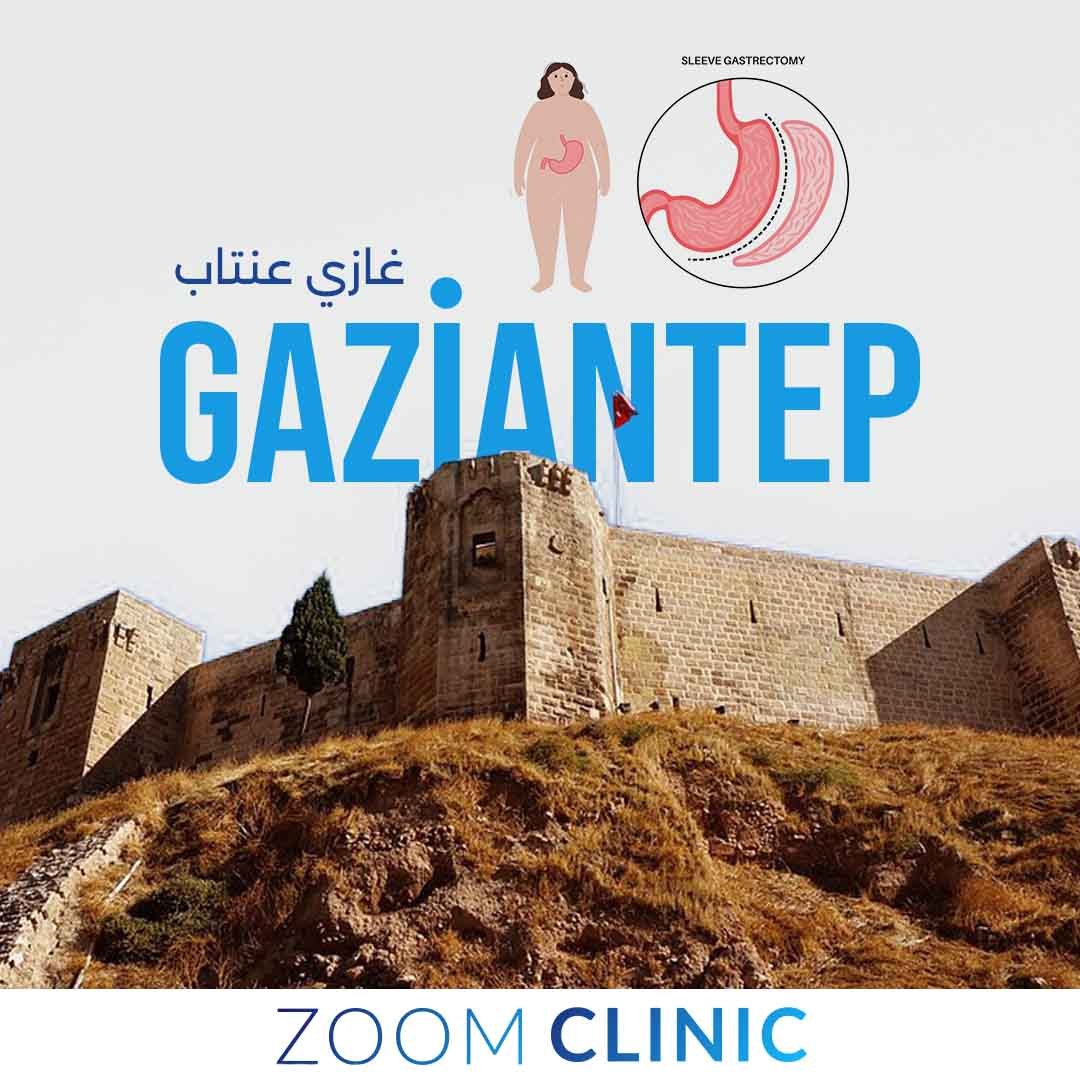The rise in obesity rates globally has led to an increase in the demand for effective weight loss solutions. For many individuals, diet and exercise alone are insufficient for achieving and maintaining significant weight loss. Bariatric surgery, particularly gastric sleeve and gastric bypass, has emerged as a highly effective treatment for obesity and its related health conditions. Gaziantep, a historic city in southeastern Turkey, has become a leading destination for individuals seeking these life-changing surgeries, offering a combination of advanced medical care, experienced surgeons, and a unique cultural experience.
At Zoom Clinic, we recognize the importance of comprehensive health solutions. So, In this guide, we aim to provide you with detailed information about gastric sleeve and gastric bypass surgeries, the benefits and risks of these procedures, and why Gaziantep is an excellent choice for your bariatric surgery journey.
Table of content
Understanding Bariatric Surgery
Bariatric surgery encompasses various procedures designed to assist with weight loss by altering the digestive system. The two most common and effective bariatric surgeries are gastric sleeve (sleeve gastrectomy) and gastric bypass (Roux-en-Y gastric bypass). These surgeries are not only about reducing weight but also improving overall health by addressing obesity-related conditions such as type 2 diabetes, hypertension, and sleep apnea.
1. Gastric Sleeve Surgery (Sleeve Gastrectomy)
Gastric sleeve surgery, also known as sleeve gastrectomy, is a restrictive procedure where approximately 75-80% of the stomach is removed, leaving behind a tube-like structure that resembles a banana. This new, smaller stomach can hold significantly less food, which leads to reduced calorie intake and weight loss. Additionally, the surgery reduces the production of the hunger hormone ghrelin, helping patients feel full sooner and less hungry overall.
Benefits of Gastric Sleeve Surgery:
- Significant Weight Loss: Most patients lose 60-70% of their excess weight within the first year after surgery.
- Improvement in Obesity-Related Conditions: Many patients see a significant improvement or complete resolution of conditions like type 2 diabetes, high blood pressure, and sleep apnea.
- Reduced Hunger: Decreased production of the hunger hormone ghrelin leads to reduced appetite.
- Shorter Recovery Time: Gastric sleeve surgery typically requires a shorter hospital stay and recovery period compared to more complex bariatric procedures.
- Simplicity: The procedure is less complicated than gastric bypass and does not involve rerouting the intestines.
Risks and Considerations:
- Potential for Leakage: There is a small risk of leakage from the stapled portion of the stomach, which can lead to serious complications.
- Nutrient Deficiencies: Patients may experience deficiencies in nutrients such as iron, calcium, and vitamins B12 and D, necessitating lifelong supplementation.
- Acid Reflux: Some patients may develop or experience worsening of acid reflux (GERD) post-surgery.
- Weight Regain: Although weight regain is less common, it can occur if patients do not adhere to dietary recommendations and lifestyle changes.
2. Gastric Bypass Surgery (Roux-en-Y Gastric Bypass)
Gastric bypass surgery is a more complex procedure that involves creating a small pouch from the stomach and connecting it directly to the small intestine, effectively bypassing the rest of the stomach and a portion of the intestines. This not only limits food intake but also reduces the absorption of nutrients, leading to significant weight loss.
Benefits of Gastric Bypass Surgery:
- Significant Weight Loss: Patients typically lose 65-85% of their excess weight within the first year.
- Resolution of Comorbidities: Gastric bypass has a high success rate in resolving or improving conditions like type 2 diabetes, hypertension, and dyslipidemia.
- Long-Term Weight Loss: With proper lifestyle changes, gastric bypass patients often maintain their weight loss over the long term.
- Reduction in Hunger: The surgery alters the hormones in the digestive system, leading to decreased hunger and appetite.
Risks and Considerations:
- Nutrient Deficiencies: Due to the bypassing of part of the intestines, patients are at a higher risk of deficiencies in iron, calcium, folate, and vitamins B12 and D.
- Dumping Syndrome: This condition occurs when food moves too quickly from the stomach to the small intestine, causing symptoms like nausea, vomiting, and diarrhea.
- Surgical Complications: As with any surgery, there is a risk of complications such as bowel obstruction, hernias, and ulcers.
- Lifestyle Changes: Long-term success depends on the patient’s commitment to lifestyle changes, including diet and exercise.
Why Choose Gaziantep for Bariatric Surgery?

Gaziantep has emerged as a preferred destination for bariatric surgery, attracting patients from around the world. Here are the key reasons why Gaziantep is an excellent choice for those considering gastric sleeve or gastric bypass surgery:
1. Highly Skilled Surgeons with Extensive Experience
Gaziantep is home to some of Turkey’s most experienced bariatric surgeons, many of whom have received training and certifications from internationally recognized institutions. With over a decade of experience, these surgeons have performed thousands of successful gastric sleeve and gastric bypass surgeries. Their expertise ensures that patients receive the highest standard of care, minimizing the risk of complications and maximizing the likelihood of successful outcomes.
2. World-Class Medical Facilities
The medical facilities in Gaziantep are equipped with the latest technology and adhere to international standards of healthcare. Hospitals and clinics in the city offer state-of-the-art operating rooms, advanced diagnostic tools, and comfortable recovery suites. The focus on quality and patient safety ensures that all aspects of the surgical journey, from pre-operative consultations to post-operative care, are handled with the utmost professionalism.
3. Affordable Costs Without Compromising Quality
One of the most significant advantages of undergoing bariatric surgery in Gaziantep is the cost. Compared to many Western countries, the cost of gastric sleeve and gastric bypass surgeries in Turkey is significantly lower. Despite the affordability, patients can expect the same, if not better, quality of care as they would receive in more expensive countries. The cost-effectiveness of bariatric surgery in Gaziantep makes it accessible to a wider range of patients.
4. Comprehensive Care and Support
Undergoing bariatric surgery is a life-changing decision that requires comprehensive care and support throughout the process. In Gaziantep, patients receive personalized care plans that include pre-operative assessments, nutritional counseling, and post-operative follow-ups. This holistic approach ensures that patients are well-prepared for surgery and supported in their recovery and long-term weight management.
5. Cultural Experience
In addition to its medical expertise, Gaziantep offers a unique cultural experience for international patients. The city is known for its rich history, vibrant markets, and world-famous cuisine. Patients can combine their medical journey with an exploration of Gaziantep’s cultural heritage, making their stay in Turkey both enriching and memorable.
Preparing for Gastric Sleeve or Gastric Bypass Surgery in Gaziantep

Deciding to undergo bariatric surgery is a significant step toward improving your health and quality of life. Here’s what you need to know about preparing for gastric sleeve or gastric bypass surgery in Gaziantep:
1. Initial Consultation
The first step in your bariatric surgery journey is an initial consultation with a qualified surgeon in Gaziantep. During this consultation, the surgeon will evaluate your medical history, current health status, and weight loss goals to determine the most suitable procedure for you. This consultation can often be conducted remotely via video call if you are traveling from abroad.
2. Pre-Operative Assessments
Before the surgery, you will undergo a series of pre-operative assessments to ensure that you are a good candidate for the procedure. These assessments may include blood tests, imaging studies, and a thorough physical examination. You will also meet with a nutritionist to discuss dietary changes and a psychologist to assess your mental readiness for surgery.
3. Travel and Accommodation Arrangements
Gaziantep is well-connected by air, with frequent flights from major international hubs. Most hospitals and clinics in Gaziantep offer assistance with travel and accommodation arrangements, making the process as seamless as possible. Some packages even include airport transfers, hotel stays, and guided tours of the city.
4. Surgical Procedure
On the day of the surgery, you will be admitted to the hospital and prepared for the procedure. The surgery itself typically takes 1-2 hours, depending on the complexity of the case. Most patients spend 2-3 days in the hospital after the surgery for monitoring and initial recovery.
5. Post-Operative Care and Recovery
After the surgery, you will receive detailed instructions on post-operative care, including dietary guidelines, physical activity recommendations, and medication management. Follow-up appointments with your surgeon will be scheduled to monitor your progress and address any concerns. It is crucial to adhere to the prescribed diet and lifestyle changes to achieve optimal results.
Life After Bariatric Surgery
Bariatric surgery is not a quick fix; it is a tool that helps you achieve long-term weight loss and improve your overall health. However, the success of the surgery largely depends on your commitment to making permanent lifestyle changes. Here are some key aspects of life after gastric sleeve or gastric bypass surgery:
1. Dietary Changes
Your diet will change significantly after surgery. Initially, you will be on a liquid diet, gradually progressing to pureed foods, soft foods, and eventually regular foods. Portion control is critical, as your new stomach can hold much less food. You will need to focus on consuming high-protein, low-sugar, and low-fat foods while avoiding empty calories and unhealthy snacks.
2. Regular Exercise
Physical activity is essential for maintaining weight loss and overall health after bariatric surgery. You should aim to incorporate regular exercise into your daily routine, starting with light activities such as walking and gradually increasing the intensity as you recover. Exercise not only helps with weight loss but also improves cardiovascular health, muscle tone, and mental well-being.
3. Nutritional Supplements
Since both gastric sleeve and gastric bypass surgeries can lead to nutrient deficiencies, it is important to take prescribed vitamins and mineral supplements for the rest of your life. These may include multivitamins, calcium, vitamin D, iron, and vitamin B12. Regular blood tests will help monitor your nutrient levels and ensure that any deficiencies are addressed promptly.
4. Long-Term Follow-Up
Regular follow-up appointments with your surgeon and healthcare team are crucial for monitoring your progress and addressing any complications that may arise. These appointments provide an opportunity to discuss your weight loss, dietary adherence, and any physical or emotional challenges you may be facing.
5. Mental and Emotional Support
Weight loss surgery is a significant life event that can bring about emotional and psychological changes. It is important to have a support system in place, whether it be through counseling, support groups, or online communities. Many patients find it helpful to connect with others who have undergone similar procedures to share experiences and offer encouragement.
Conclusion
Gastric sleeve and gastric bypass surgeries are powerful tools for achieving significant and sustained weight loss, especially for those struggling with obesity and related health conditions. Gaziantep, with its experienced surgeons, state-of-the-art facilities, and affordable care, is an ideal destination for individuals considering these life-changing procedures.
At Zoom Clinic, we understand the importance of making informed decisions about your health and we are committed to supporting you in your journey toward overall wellness. We hope this comprehensive guide has provided you with valuable insights into gastric sleeve and gastric bypass surgeries and why Gaziantep is an excellent choice for your bariatric surgery journey.
If you are ready to take the next step, we encourage you to consult with a qualified bariatric surgeon in Gaziantep to discuss your options and begin your path toward a healthier, happier life.
Get the special offer today from Zoom Clinic
FAQs: Gastric Sleeve and Gastric Bypass Surgery in Gaziantep
1. What is the difference between gastric sleeve and gastric bypass surgery?
Gastric Sleeve Surgery: Involves removing approximately 75-80% of the stomach, leaving a smaller, tube-shaped stomach. This restricts food intake and reduces the production of the hunger hormone ghrelin.
Gastric Bypass Surgery: Involves creating a small stomach pouch and bypassing a portion of the small intestine. This reduces food intake and nutrient absorption, leading to significant weight loss.
2. How much weight can I expect to lose after surgery?
Gastric Sleeve: Patients typically lose 60-70% of their excess weight within the first year.
Gastric Bypass: Patients can expect to lose 65-85% of their excess weight within the first year.
3. Is bariatric surgery safe?
Both gastric sleeve and gastric bypass surgeries are considered safe when performed by experienced surgeons in accredited medical facilities. However, like any surgery, there are risks involved, including infection, bleeding, and complications related to anesthesia.
4. What are the risks associated with these surgeries?
Gastric Sleeve: Potential risks include leakage from the stapled portion of the stomach, nutrient deficiencies, and acid reflux.
Gastric Bypass: Risks include nutrient deficiencies, dumping syndrome, bowel obstruction, and ulcers.
5. How long is the recovery period after surgery?
Most patients can return to normal activities within 2-4 weeks after surgery. Full recovery, including resuming more strenuous activities, may take 6-8 weeks.
6. Will I need to take vitamins and supplements after surgery?
Yes, both surgeries can lead to nutrient deficiencies. Patients are usually required to take lifelong supplements, including multivitamins, calcium, vitamin D, iron, and vitamin B12.
7. How long will I stay in the hospital after surgery?
Most patients stay in the hospital for 2-3 days after gastric sleeve or gastric bypass surgery. This allows the medical team to monitor your recovery and manage any immediate post-operative issues.
8. Can the surgery be reversed?
Gastric Sleeve: This procedure is generally not reversible because a large portion of the stomach is permanently removed.
Gastric Bypass: While technically reversible, reversing a gastric bypass is a complex and risky procedure and is generally only considered in extreme circumstances.
9. How soon after surgery can I return to work?
Depending on the nature of your job, you can typically return to work within 2-4 weeks. If your job involves heavy physical activity, you may need to wait longer.
Read Also:


